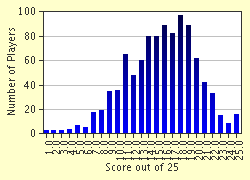Quiz Answer Key and Fun Facts
1. A subject of English literature, which Scottish king killed Duncan I to seized the throne in 1040?
2. What group conquered the Russians, Ukrainians, and Siberians in the 13th century and established the Empire of the Golden Horde?
3. When did the Black Death (or Bubonic Plague) first ravage Western Europe in the Middle Ages?
4. The Hundred Years' War was fought between what two European countries?
5. Vasco da Gama, who discovered a sea route in the 15th century to India around the continent of Africa, was from what European country?
6. What group used the agricultural method of terracing in the Andes Mountains during the 15th century?
7. The beginning of the Renaissance in Italy began in what century?
8. Who defeated the English at the Battle of Hastings in 1066?
9. What was the Casa di San Giorgio, built in 1407 in Genoa?
10. A principal dynasty in Europe from the 15th to the 20th centuries, the first of these Holy Roman Emperors was Rudolph I (1273-1291), who was supported by Pope Gregory X during the 13th century. What was this dynasty?
11. Which was constructed first, the Cathedral or the Tower, in Pisa, Italy?
12. Who was the first to translate the Bible from Latin to English?
13. When Christopher Columbus landed on a Caribbean island in 1492, what present day nation did he land on first?
14. In 1260, the Mongols led by Kublai Khan overtook China and ruled until 1368. What dynasty was this?
15. Of the four universities listed, which school was founded circa 1170 as a result of an edict issued by King Henry II?
16. The Aztec capital was founded around 1325 in central Mexico and was called what?
17. Which English King was forced to sign the Magna Carta in 1215?
18. What English martyr was nominated an archbishop under King Henry II?
19. Joan of Arc was a heroine during what war?
20. Which Russian ruler ceased to pay tribute to the Mongols and began the Imperial Russian period in 1462?
21. What Venetian traveler and explorer landed in China and reached Kublai Khan's court in 1275?
22. Constantinople fell to the Ottoman Turks in what year?
23. What empire ruled by Mansa Musa reached its height in Africa from 1312-1337?
24. The War of the Roses pitted what two English royal families at odds?
25. The legend of this 12th century English bandit-hero was mostly made known through the ballads and songs of wandering minstrels, who weaved a patchwork of "fact" and fiction into the contemporary culture of the time. A number of versions of this legend have emerged. Who was this legendary folklore hero?
Source: Author
Sprink1234
This quiz was reviewed by FunTrivia editor
bloomsby before going online.
Any errors found in FunTrivia content are routinely corrected through our feedback system.


